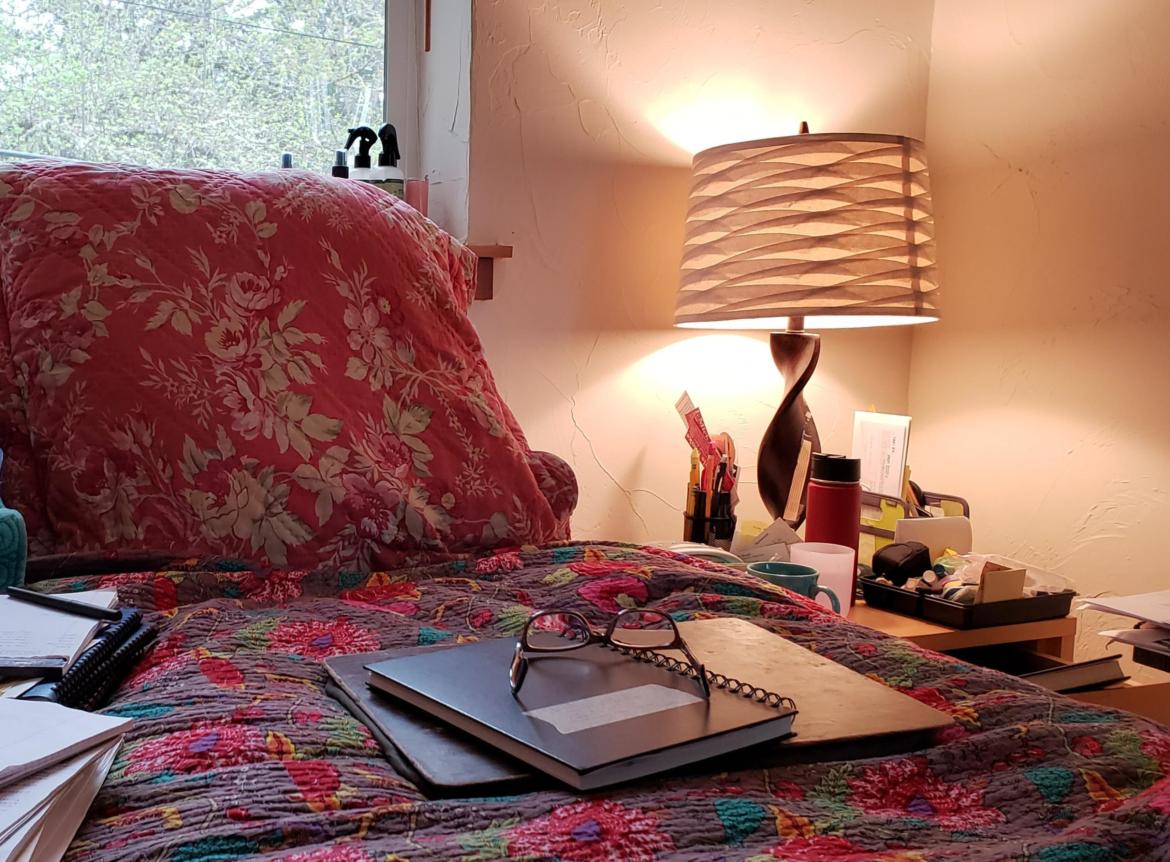My husband and I push a cart through Target. Bearing a list, he is purposeful: coffee, cat litter, Tums, toothpaste. I, along for the ride, am easily diverted.
“I’ll catch up with you,” I say, trailing my fingers over a stack of jewel-toned velvet comforters. I test several pillows for firmness, search to see if they carry organic cotton sheets. We don’t need new bedding, but I’m drawn to looking nonetheless, always seeking to tweak the look and feel of our bed, to adorn it with comfort and color. Detouring quickly through sleepwear I admire the fleecy robes then linger over a black shortie nightie set made from a soft synthetic fabric I should eschew for climate reasons, but which reminds me of what my mother might have worn when I was a child. I slip the hanger off the rack, catch up with my husband, and toss the nightie into our cart. He laughs, knowing my reverence for sleep and all its accoutrements.
The siren call of sleep is, to me, irresistible. Its privacy is an introvert’s paradise—no one intrudes. The hush of the bedroom. The refuge of the bed, a bower with its cradling mattress and pillows. The weight of the covers. The delicious sensation of being ferried away on a tide of forgetfulness, the day’s troubles dissolving. Waking briefly in the wee hours to think: It’s still dark—more time to sleep!
There are children who resist bedtime, loathe—or fearful—to leave the waking world. I was not one of those children. I have been an inveterate sleeper from a young age, falling asleep quickly, then sleeping long and hard. At sleepovers I was always the party pooper, the one who could never stay up until midnight, let alone all night. Often I fought heavy lids as a friend talked on beside me. Once fire engines came to our house when the dishwasher ignited, awakening my parents and sisters; to my chagrin, I slept through the excitement. I am perhaps the only person I know who never pulled a college all-nighter. I was cured in seventh grade when I realized, near the end of a term, that I had not one, but several, unfinished book reports due the next day. A committed student, I knew I had to stay up until they were done. The silence of the household at 3:30 in the morning was threaded with such existential terror—only me and the moon and the owls awake as my parents and sisters slept. I have never been remotely tempted to repeat that experience.
So many beds over the years. The four-poster bed of my childhood and adolescence, the lumpy secondhand mattresses of early adulthood, the raised platform bed in New York (a wedding gift from my parents) with storage beneath and in the headboard, the first king bed with all its extra real estate. So much of my history transpired on those beds: furtive first kisses, good and bad sex, an endless night (my only other all-nighter) when a crazed male acquaintance broke into my apartment and wouldn’t leave, a marriage proposal, the ruptured ovarian pregnancy when New York City ambulance workers had to lift me onto a stretcher from the mattress on the floor, the thousands of cups of coffee consumed over conversations, meaningful and quotidian. No place in my life has been more central than my bed.
It was a slow evolution for my bed to become my workplace. In my early days as a writer, it was sometimes difficult to feel writing was a valid activity. No one was reading my work and it wasn’t earning me money, so how could it be important? I often set writing aside to do things the world deemed more worthy. But, I began to realize, if I stayed in bed no one would know what I was doing. No one could interrupt me there to lure me into other activities; after all I might be sleeping. And, if I wrote upon waking, then I could get the writing under my belt and turn my attention to other activities later in the day. At that same time, I was attentive to research about dreams. I had participated in a dream lab experiment, and had tried to teach myself to dream lucid dreams. It occurred to me there might be some benefit in writing as soon after sleeping (and dreaming) as possible. Staying in bed to write as soon as I woke became an elegant solution. I began the practice when I was living alone and have continued it for the past twenty years. I like to think of it as writing in the penumbra of sleep.
I often wonder if I would have become a writer were I not such an afficionado of sleep. The allure of both activities is similar. Both demand solitude. Both activities deliver the practitioner into a state of flow in which brain waves are altered, the hegemony of the prefrontal cortex dims, and a wilderness of unexpected thoughts, images, words meet and mingle into dreams (in the case of the sleeper), and fiction or poetry (in the case of the writer).
What is the best metaphor for the magnificence of sleep? A palace? A temple? A cathedral? Maybe an entire kingdom. It’s an expansive place, rife with hidden precincts, chambers, crypts. It’s a place that can never be fully known. Each night offers a different mix of deep sleep, REM, light sleep, waking.
Writing is similarly unpredictable, fluctuating. The writer is the dreamer, synthesizing current emotions with past experiences, searching for meaningful connections. And maybe, just possibly, a satisfying narrative comes to life.

Add Comment